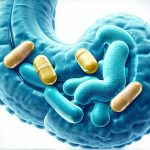Chronic indigestion, also known as dyspepsia, is a frustratingly common condition affecting millions worldwide. It’s not a disease in itself, but rather a collection of symptoms – bloating, heartburn, nausea, feeling full too quickly, and stomach discomfort – that can significantly impact quality of life. Many factors contribute to chronic indigestion, ranging from dietary choices and stress levels to underlying medical conditions and even the composition of our gut microbiome. Traditional treatments often focus on symptom management with antacids or acid-reducing medications, but increasingly, research is highlighting the potential of modulating the gut microbiome – specifically through probiotics – as a more holistic approach to long-term relief. Understanding why indigestion occurs is crucial; it’s rarely just “too much food” and often involves complex interactions between the stomach, intestines, brain, and resident bacteria.
The digestive system relies on a delicate balance of microorganisms for optimal function. When this balance is disrupted – by factors like antibiotics, poor diet, or stress – it can lead to dysbiosis, an imbalance in gut flora. This disruption can contribute to inflammation, altered motility (how quickly food moves through the digestive tract), and increased sensitivity to stimuli within the gut, all of which are hallmarks of chronic indigestion. Probiotics, live microorganisms that confer a health benefit on the host when administered in adequate amounts, offer a promising avenue for restoring this balance and easing symptoms. However, it’s not as simple as taking any probiotic; different strains have vastly different effects, and selecting the right ones is key to achieving meaningful results. This article will delve into some of the most researched and potentially beneficial probiotic strains for managing chronic indigestion, exploring their mechanisms of action and offering guidance on choosing the right supplement.
The Gut-Brain Connection and Probiotic Impact
Chronic indigestion isn’t solely a digestive issue; it’s deeply intertwined with the brain through what is known as the gut-brain axis. This bidirectional communication system involves neural pathways, hormones, and immune responses. Stress, anxiety, and even depression can significantly impact digestion, and conversely, digestive issues can contribute to mood disorders. A dysfunctional microbiome can exacerbate this connection, sending inflammatory signals to the brain and influencing neurotransmitter production. Probiotics can potentially modulate this axis in several ways:
- By reducing inflammation in the gut, lessening the signaling of discomfort to the brain.
- By producing neurotransmitters like serotonin and GABA, which play vital roles in mood regulation.
- By strengthening the intestinal barrier, preventing “leaky gut” and minimizing immune activation.
Certain strains have demonstrated a particularly strong ability to influence these pathways. For example, some Bifidobacterium species are known to reduce cortisol levels (a stress hormone) and improve psychological well-being in individuals experiencing digestive distress. The impact isn’t merely symptomatic; it suggests probiotics can address the underlying neurological factors contributing to chronic indigestion. This holistic approach differentiates probiotic therapy from simply masking symptoms with medication.
Furthermore, the role of visceral hypersensitivity is increasingly recognized in chronic indigestion. This refers to an increased sensitivity to normal sensations within the gut, leading to discomfort even at levels that wouldn’t bother most people. Probiotics may help desensitize the gut by modulating nerve function and reducing inflammation, ultimately lessening the perception of pain or bloating. It’s important to note this is still an area of active research, but early findings are encouraging. If you suspect underlying issues, consider best diagnostics for a more accurate assessment.
Specific Strains Showing Promise for Indigestion Relief
Several probiotic strains have been investigated for their ability to alleviate chronic indigestion symptoms. While more research is always needed, some stand out due to consistent positive results in clinical trials. Lactobacillus plantarum 299v, for instance, has shown significant benefits in reducing bloating, abdominal pain, and overall discomfort in individuals with functional dyspepsia (indigestion without an identifiable cause). This strain appears to improve gastric emptying – the rate at which food leaves the stomach – preventing feelings of fullness. Similarly, Bifidobacterium infantis 35624 has demonstrated efficacy in alleviating symptoms of Irritable Bowel Syndrome (IBS), a condition often overlapping with chronic indigestion, particularly IBS-D (diarrhea-predominant).
Another noteworthy strain is Saccharomyces boulardii, a probiotic yeast rather than bacteria. Although less conventional, it’s proven effective in preventing antibiotic-associated diarrhea and restoring gut balance after antibiotic use – a common trigger for digestive issues. Importantly, the effectiveness of probiotics isn’t just about the species; even within a single species, different strains can have dramatically different effects. Therefore, focusing on strain-specific research is critical when choosing a probiotic supplement. Look for products that clearly identify the strain number (e.g., 299v) rather than simply listing the genus and species (e.g., Lactobacillus plantarum). This can be aided by understanding gut inflammation.
Addressing Functional Dyspepsia with Probiotics
Functional dyspepsia, characterized by persistent digestive symptoms without any detectable structural or biochemical abnormalities, poses a particular challenge for treatment. Traditional approaches often yield limited success, leaving many sufferers searching for alternative solutions. Probiotics offer a compelling option due to their ability to address the underlying microbiome imbalances that may contribute to this condition. Lactobacillus reuteri DSM 17938 has shown promise in reducing abdominal pain and discomfort in patients with functional dyspepsia, potentially by modulating gut motility and reducing visceral hypersensitivity. Studies suggest it can help restore a more balanced microbial community and improve the overall health of the digestive tract.
The mechanisms behind its effectiveness are still being investigated, but researchers believe L. reuteri DSM 17938 may influence the production of short-chain fatty acids (SCFAs), beneficial compounds produced by gut bacteria that play a crucial role in gut health and inflammation reduction. Furthermore, it appears to have anti-inflammatory properties, helping to quell the chronic low-grade inflammation often associated with functional dyspepsia. It’s important to remember that probiotic effects are individual; what works for one person may not work for another. A trial period is often recommended to assess tolerance and efficacy. Dietary changes can also help – consider pantry staples that support digestion.
Probiotics and Delayed Gastric Emptying
Delayed gastric emptying, where food remains in the stomach for an abnormally long time, is a common contributor to indigestion symptoms like bloating, fullness, and nausea. Certain probiotic strains can help accelerate gastric emptying, improving digestive comfort. As mentioned earlier Lactobacillus plantarum 299v has been shown to improve gastric transit time. This strain seems to influence the vagus nerve, which plays a key role in regulating stomach contractions and food movement.
Another potential avenue for addressing delayed gastric emptying involves probiotics that promote the production of motilin, a hormone that stimulates intestinal peristalsis (muscle contractions that move food along the digestive tract). While research is still emerging, some studies suggest certain Bifidobacterium species may enhance motilin secretion. It’s also worth noting that dietary factors can significantly impact gastric emptying; consuming fiber-rich foods and avoiding high-fat meals can help speed up digestion. Probiotics should be viewed as part of a holistic approach to managing delayed gastric emptying, alongside lifestyle modifications. Understanding gut issues can also inform your strategy.
Choosing the Right Probiotic Supplement
Navigating the probiotic market can be overwhelming given the vast array of products available. Here are some key considerations:
- Strain Specificity: Prioritize supplements that clearly list the strain number (e.g., Lactobacillus plantarum 299v) rather than just the species.
- CFU Count: Colony Forming Units (CFUs) indicate the number of live microorganisms per dose. Look for products with a CFU count appropriate for your needs, typically in the billions range. However, higher isn’t always better; focus on quality over quantity.
- Viability & Shelf Stability: Ensure the probiotic is formulated to maintain its viability – meaning the bacteria remain alive and active – until expiration. Some probiotics require refrigeration, while others are shelf-stable.
- Third-Party Testing: Look for products that have been independently tested by a third party (e.g., USP, NSF International) to verify their quality and purity.
- Consider Your Individual Needs: Different strains target different symptoms. If your primary issue is bloating, Lactobacillus plantarum 299v might be a good starting point. For IBS-related indigestion, Bifidobacterium infantis 35624 could be considered.
- Start Slowly and Monitor: Begin with a low dose to assess tolerance and gradually increase if needed. Pay attention to how your body responds and adjust accordingly. If symptoms worsen or persist, discontinue use and consult with a healthcare professional.
It’s vital to remember that probiotics are not a quick fix. It often takes several weeks or even months of consistent use to experience significant benefits. Furthermore, probiotic supplementation should be combined with other healthy lifestyle habits – a balanced diet, regular exercise, stress management techniques – for optimal digestive health. If unexplained symptoms persist, testing practices may be necessary to rule out other conditions and tailor your approach effectively. Finally, consider how cooking methods impact your digestion.


















